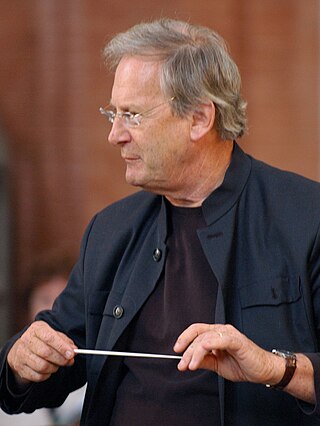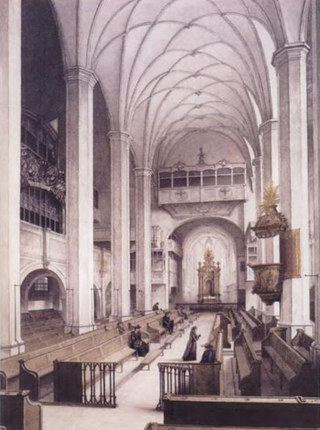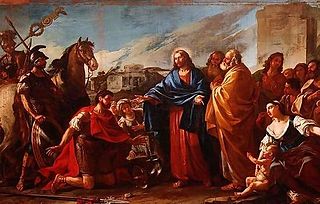
Sir John Eliot Gardiner is an English conductor, particularly known for his performances of the works of Johann Sebastian Bach, especially the Bach Cantata Pilgrimage of 2000, performing Bach's church cantatas in liturgical order in churches all over Europe, and New York City, with the Monteverdi Choir, and recording them at the locations.
The Gramophone Classical Music Awards, launched in 1977, are one of the most significant honours bestowed on recordings in the classical record industry. They are often viewed as equivalent to or surpassing the American Grammy award, and referred to as the Oscars for classical music. They are widely regarded as the most influential and prestigious classical music awards in the world. According to Matthew Owen, national sales manager for Harmonia Mundi USA, "ultimately it is the classical award, especially worldwide."

The English Baroque Soloists is a chamber orchestra playing on period instruments, formed in 1978 by English conductor Sir John Eliot Gardiner. Its repertoire comprises music from the early Baroque to the Classical period.
The Monteverdi Choir was founded in 1964 by Sir John Eliot Gardiner for a performance of the Vespro della Beata Vergine in King's College Chapel, Cambridge. A specialist Baroque ensemble, the Choir has become famous for its stylistic conviction and extensive repertoire, encompassing music from the Renaissance period to Classical music of the 20th century. They often appear with John Eliot Gardiner's orchestras, the English Baroque Soloists and Orchestre Révolutionnaire et Romantique.
Daniel John Taylor, is a Canadian countertenor and early music specialist. Taylor runs the Theatre of Early Music and teaches at the University of Toronto.

Johann Sebastian Bach composed the church cantata Es ist nichts Gesundes an meinem Leibe, BWV 25 in Leipzig for the 14th Sunday after Trinity and first performed it on 29 August 1723.

Gottlob! nun geht das Jahr zu Ende, BWV 28, is a church cantata by Johann Sebastian Bach for the Sunday after Christmas. He first performed it on 30 December 1725.

Johann Sebastian Bach composed the church cantata Herr, deine Augen sehen nach dem Glauben, BWV 102 in Leipzig for the tenth Sunday after Trinity and it was first performed on 25 August 1726.

Johann Sebastian Bach composed the church cantata Warum betrübst du dich, mein Herz, BWV 138, in Leipzig for the 15th Sunday after Trinity and first performed it on 5 September 1723. The text by an unknown author includes three stanzas from the hymn of the same name. Its text and melody were formerly attributed to Hans Sachs, but were written by an unknown hymn writer. The cantata has seven movements and is scored for SATB soloists and choir, two oboes d'amore, two violins, viola and basso continuo. The cantata has features of a chorale cantata although it was written a year before Bach's annual cycle of chorale cantatas. Bach used an aria as the base of the Gratias of his Missa in G major.

Johann Sebastian Bach composed the church cantata Ich glaube, lieber Herr, hilf meinem Unglauben, BWV 109, in Leipzig for the 21st Sunday after Trinity and first performed it on 17 October 1723.

Johann Sebastian Bach composed the church cantata Falsche Welt, dir trau ich nicht, BWV 52, in Leipzig for the 23rd Sunday after Trinity. He led the first performance of the solo cantata for soprano on 24 November 1726.

Selig ist der Mann, BWV 57, is a church cantata by Johann Sebastian Bach. He wrote the Christmas cantata in Leipzig in 1725 for the Second Day of Christmas, which was celebrated that year as St. Stephen's Day, and first performed it on 26 December 1725.

Schau, lieber Gott, wie meine Feind, BWV 153, is a church cantata by Johann Sebastian Bach. He composed it in Leipzig for the Sunday after New Year's Day and first performed it on 2 January 1724.

Nimm, was dein ist, und gehe hin, BWV 144, is a church cantata by Johann Sebastian Bach. He composed it in Leipzig for the Sunday Septuagesimae, the third Sunday before Lent, and first performed it on 6 February 1724.

Erhöhtes Fleisch und Blut, BWV 173, is a church cantata by Johann Sebastian Bach. He composed it in Leipzig for Pentecost Monday and probably first performed it on 29 May 1724.

Johann Sebastian Bach composed the church cantata Nimm von uns, Herr, du treuer Gott, BWV 101 in Leipzig for the tenth Sunday after Trinity and first performed it on 13 August 1724. The chorale cantata is based on the hymn by Martin Moller (1584).

Also hat Gott die Welt geliebt, BWV 68, is a cantata by Johann Sebastian Bach, a church cantata for the second day of Pentecost. Bach composed the cantata in Leipzig and first performed it on 21 May 1725. It is one of nine cantatas on texts by Christiana Mariana von Ziegler, which Bach composed at the end of his second annual cycle of cantatas in Leipzig. In a unique structure among Bach's church cantatas, it begins with a chorale and ends with a complex choral movement on a quotation from the Gospel of John. Bach derived the two arias from his Hunting Cantata.

Johann Sebastian Bach composed the church cantata Wohl dem, der sich auf seinen Gott, BWV 139, in Leipzig for the 23rd Sunday after Trinity and first performed it on 12 November 1724. The chorale cantata is based on the hymn by Johann Christoph Rube (1692).
Lobe den Herrn, meine Seele, BWV 143, is an early cantata by Johann Sebastian Bach. He appears to have composed the cantata for New Year's Day, probably when he was in his 20s, but whether it was first performed in Mühlhausen or Weimar is not known: the date of composition is unclear. Bach's authorship has been doubted because the cantata has several unusual features; one of these is the scoring, it is the only Bach cantata to combine three corni da caccia with timpani.
Hanno Müller-Brachmann is a German bass-baritone who made an international career in both opera and concert. A member of the Berlin State Opera from 1998 to 2011, he first sang Mozart roles such as Papageno and Figaro, and created roles in premieres such as Mephistopheles in Dusapin's Faustus, the Last Night in 2006.










